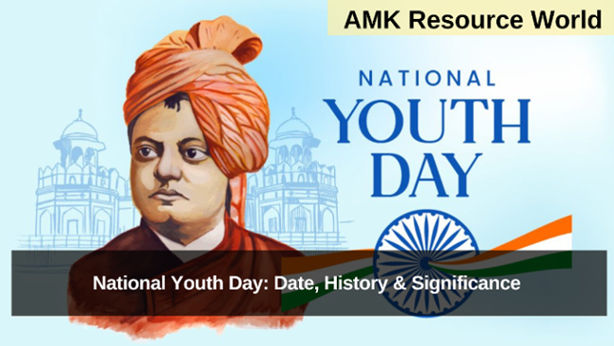National Youth Day is celebrated every year on 12th January to honour the birth anniversary of Swami Vivekananda, one of the most revered spiritual leaders and philosophers of India. Declared by the Government of India in 1984, the day is dedicated to the youth of the nation, inspiring them to follow the path of Swami Vivekananda’s teachings and principles. His profound philosophy, belief in the power of youth, and emphasis on education, spirituality, and character building continue to resonate with young minds even today.
DATE OF NATIONAL YOUTH DAY
National Youth Day is observed on 12th January, marking the birth anniversary of Swami Vivekananda, born in 1863 in Kolkata. Recognized for his immense contributions to India’s cultural and spiritual resurgence, this day highlights the importance of channeling the energy, passion, and potential of the youth towards nation-building and self-improvement.
The day coincides with various cultural and educational events organized across the country, particularly in schools, colleges, and youth centers. The events often include debates, seminars, speeches, processions, and yoga sessions to encourage the younger generation to reflect upon Swami Vivekananda’s ideals.
HISTORY OF NATIONAL YOUTH DAY
The roots of National Youth Day can be traced back to 1984 when the Indian government decided to commemorate Swami Vivekananda’s birth anniversary as a day dedicated to youth. The resolution was passed to honour his contributions to India’s intellectual and spiritual renaissance, as well as his emphasis on empowering the youth.
Swami Vivekananda’s teachings centered around the idea of self-reliance, education, and spiritual awakening, which he believed were essential for individual and societal progress. His iconic speech at the Parliament of the World’s Religions in Chicago in 1893 brought Indian philosophy and Vedantic principles to the global stage. His call to action, “Arise, awake, and stop not until the goal is reached,” continues to inspire young minds worldwide.
Since then, January 12th has been celebrated as National Youth Day to motivate Indian youth to embrace the values of determination, hard work, and responsibility that Vivekananda epitomized.
SIGNIFICANCE OF NATIONAL YOUTH DAY
National Youth Day holds great significance in India, as it recognizes the potential of the younger generation in shaping the future of the nation.
| Also read: Pravasi Bharatiya Divas: Date, History & Significance |
The day serves as a reminder of Swami Vivekananda’s belief in the power of youth as the cornerstone of societal transformation.
Empowering the Youth: The celebration emphasizes the importance of self-confidence, self-discipline, and a strong moral character, traits that Swami Vivekananda believed were essential for success.
Promoting Education and Skill Development: Education was a key focus of Swami Vivekananda’s teachings. He believed that education should be holistic, nurturing intellectual, physical, and spiritual growth. National Youth Day underscores the need for quality education and skill development to empower young people.
Encouraging Social Responsibility: Vivekananda envisioned youth as the drivers of change who could eradicate poverty, illiteracy, and social inequality. The day inspires young individuals to take active roles in community development and nation-building.
Fostering National Integration: Through celebrations, National Youth Day fosters a sense of unity, patriotism, and cultural pride among the youth, strengthening national integration.
Inspiring Personal Growth: Swami Vivekananda’s philosophy emphasizes self-realization and self-improvement as the foundation of a successful life. The day encourages youth to reflect on their personal goals and align their actions with a higher purpose.
Themes of National Youth Day
Each year, National Youth Day is celebrated with a specific theme that reflects the aspirations and challenges of the youth in contemporary times. These themes serve as a guiding framework for events and activities organized across the nation.
Some of the past themes include:
- The theme of 2024 was Arise, Awake, and Realise the Power You Hold
- The theme of 2023 was Viksit Yuva-Viksit Bharat.
- The Theme of 2022 was It’s all in the mind.
- The Theme of 2021 was YUVAAH – Utsah Naye Bharat Ka
- The theme of 2020 was Channelizing Youth Power for Nation Building.
- The Theme of 2018 was Sankalp Se Siddhi.
- The theme of 2017 was Youth for Digital India.
- The theme of 2016 was Indian Youth for Development, Skill, and Harmony
These themes are designed to resonate with current socio-economic challenges, inspiring the younger generation to actively participate in addressing these issues.
The theme for 2025 is expected to emphasize innovation, sustainability, and digital empowerment, reflecting the evolving priorities of modern youth.
CONCLUSION
National Youth Day is not just a celebration of Swami Vivekananda’s legacy but a call to action for the younger generation to rise to their potential and contribute to the nation’s progress. By embracing his teachings on education, self-confidence, and social responsibility, youth can play a transformative role in shaping a better future.
The day serves as a reminder that young people, with their energy, creativity, and determination, are the driving force behind a prosperous and progressive India. As the youth of today step forward to take on leadership roles, Swami Vivekananda’s timeless message continues to inspire and guide them.









































